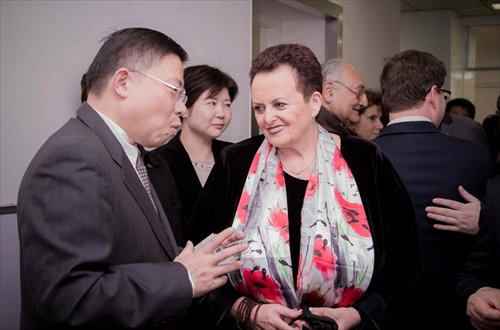China-Israel ties on the rise
R&D in IT, agriculture and medicine form bulk of trade

Yaffa Ben-Ari (right), deputy director general of the Economic Affairs Division of Israel's Ministry of Foreign Affairs, at a function Photo: Courtesy of Embassy of Israel in Beijing

An office building in Ra'anana, Isreal Photo: Song Shengxia/GT
GT: Can you elaborate on the economic and trade ties between Israel and China?
Ben-Ari: I foresee strengthening economic relations between China and Israel. Basically, trade between Israel and China has been steadily increasing in the last three years, with trade doubling between 2010 and 2014. Trade in 2010 was about $5 billion, with Israeli exports to China amounting to $1 billion. 2014 fared better than 2013. In 2014, trade value approached $11 billion and I think Israeli exports to China accounted for nearly 30 percent of that amount. While it's a positive development it's nothing compared to the potential of the Chinese market. China also invested $300 million in Israeli high technology in 2014.
GT: What were the key Israeli exports?
Ben-Ari: Generally, half of Israel's exports were either electronic components, chemicals, or medical products. If you compare 2014 to 2013, exports of other items started to rise. Business services, especially in IT and software, rose by 8 percent. We are seeing a shift in exports between products and services. Israel's global exports in 2014 amounted to $97 billion, with products making up close to 50 percent, with 30 percent in services, and the rest involving the diamond trade. So while Israeli services exports are rising, product exports are dropping. In short technological cooperation dominates economic ties between Israel and other countries and regions.
GT: Why are Israel's services exports rising, and how can that benefit China?
Ben-Ari: The IT sector will be the biggest beneficiary of our services exports. This is Israel's strength because our country is heavily involved in innovation. In Israel, innovation is a way of life. Innovation and knowledge are our growth engines. This shift in Israel's exports structure creates new opportunities for China and Israel to cooperate and to innovate together. Our governments are committed to this goal. In January, Chinese Vice Premier Liu Yandong and Israeli Foreign Minister Lieberman launched the first "China-Israel joint committee on innovation cooperation (JCIC)." Under this initiative, the two governments signed a "three-year action plan" and several other agreements to strengthen cooperation on innovation in various fields such as science, technology, and education and culture.
GT: Please explain how China and Israel will benefit from Chinese President Xi Jinping's proposed Maritime Silk Road.
Ben-Ari: Israel hopes to play a constructive and significant role in President Xi's Maritime Silk Road initiative. This is a wonderful example of how China, through strengthened international commerce and links between nations, contributes to the world's economy and prosperity. Furthermore, we believe that this initiative is another way Israel and China can collaborate and Israel welcomes any economic activity in our region. Just as our region was significant during the days of the ancient Silk Road, we believe the new initiative would help strengthen ties between nations, economies and societies.
GT: What are the advantages of Israel doing business with China?
Ben-Ari: The two nations share much in common. We both value tradition, yet we strive for modernity. We appreciate family ties, we value education, and we grow stronger as challenges increase. Another common cultural trait is striving for harmony. So I think we have understood each other more because we have similar values and behaviors. Yet there is another advantage - our economies are compatible and complement each other. The Israeli economy adapts to a process similar to what China's economy is undergoing. When the State of Israel was established 66 years ago, we were socialist. Our economy was centrally planned but eventually involved the private sector. We developed our industries. We quickly shifted from socialism to a much more liberal market, something which is similar to what China is doing through your reforms. Hence, our economies share not only the same development path, but also a common need to develop. Both economies were export-oriented, and both economies are developing areas of growth. Israel boasts of high technology in IT, medicine, and agriculture. China has more space, more people, more time, but more challenges. I think together, Israel and China are perfect for each other despite differences in size.
GT: What challenges does Israel face in improving economic cooperation with China?
Ben-Ari: Despite our cultural differences, I think Israel more keenly understands those challenges, in learning the Chinese language, learning Chinese habits and preparing for a long-term relationship. On intellectual property issues, I think the Chinese government has shown growing concern and a greater understanding of this concern. Cooperation in R&D began six years ago, with an industrial R&D agreement bringing companies from both China and Israel in a joint venture to conduct not only pure research but applied research as well. So it is the basis for a much longer relationship, a long-term cooperation. But the IP issue definitely has to be addressed.
GT: Compared with brands from other developed countries, Israeli brands are not very well-known in China. How can you improve the awareness of Israel's brands among Chinese businesses?
Ben-Ari: First, to arrange visits, conferences and meetings in China in order to connect Israeli companies to their Chinese counterparts and assist them to better understand the Chinese market. And second, to encourage Chinese people to visit Israel and to experience for themselves what Israel has to offer. For example, an international agriculture exhibition, AGRITECH, will be held in Israel this April. This exhibition aims to introduce the latest Israeli agriculture technologies to visitors from different countries, including China.